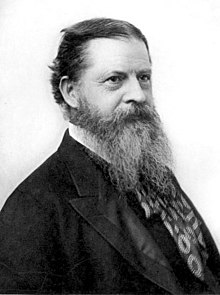Charles Sanders Peirce
Charles Sanders Peirce (/ˈpɜːrs/,[8] like "purse", September 10, 1839 – Aprile 19, 1914) wis an American philosoper, logician, mathematician, an scientist that is at times kent as "the faither o pragmatism".
 Charles Sanders Peirce | |
| Born | September 10, 1839 in Cambridge, Massachusetts |
|---|---|
| Died | Aprile 19, 1914 (aged 74) in Milford, Pennsylvanie |
| Naitionality | American |
| Fields | Logic, Mathematics, Stateestics,[1][2] philosophy, Metrology,[3] Chemistry, Experimental psychology[4] Economics,[5] Lingueestics,[6] History o science |
| Releegious stance | Episcopal (unconventional)[7] |
References
eedit- ↑ Hacking, Ian (1990), "A Universe of Chance", The Taming of Chance, pp. 200–215, Cambridge U. Pr.
- ↑ Stigler, Stephen M. (1978). "Mathematical statistics in the early States". Annals of Statistics. 6: 239–265 [248]. doi:10.1214/aos/1176344123. JSTOR 2958876. MR 0483118.
- ↑ Crease, Robert P (2009). "Charles Sanders Peirce and the first absolute measurement standard: In his brilliant but troubled life, Peirce was a pioneer in both metrology and philosophy". Physics Today. 62 (12): 39–44. doi:10.1063/1.3273015. Archived frae the original on 12 Januar 2013. Retrieved 2 Februar 2016.
- ↑ Cadwallader, Thomas C. (1974). "Charles S. Peirce (1839-1914): The first American experimental psychologist". Journal of the History of the Behavioral Sciences. 10 (3): 291. doi:10.1002/1520-6696(197407)10:3<291::AID-JHBS2300100304>3.0.CO;2-N.
- ↑ Wible, James R. (2008), "The Economic Mind of Charles Sanders Peirce Archived 2012-10-23 at the Wayback Machine", Contemporary Pragmatism, v. 5, n. 2, December, pp. 39-67
- ↑ Nöth, Winfried (2000), "Charles Sanders Peirce, Pathfinder in Linguistics Archived 2012-04-26 at the Wayback Machine", Digital Encyclopedia of Charles S. Peirce.
- ↑ Joseph Brent (1998). Charles Sanders Peirce: A Life (2 ed.). Indiana University Press. p. 18. ISBN 9780253211613. Retrieved 24 September 2012.
Peirce had strong, though unorthodox, religious convictions. Although he was a communicant in the Episcopal church for most of his life, he expressed contempt for the theologies, metaphysics, and practices of established religions.
- ↑ "Peirce", in the case of C.S. Peirce, always rhymes with the English-language word "terse" and so, in most dialects, is pronounced exactly like the English-language word " purse (help·info)". See "Note on the Pronunciation of 'Peirce' Archived 2016-03-03 at the Wayback Machine", Peirce Project Newsletter, v. 1, nos. 3/4, Dec. 1994.